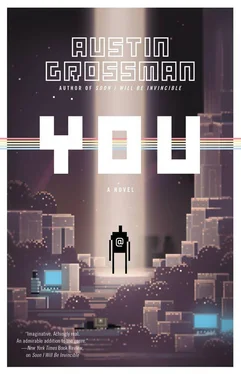Right now, no one knows. This is partly because many would consider the very idea frivolous. But it’s also because whoever successfully answers this question must first have answered several others.
Why do we cry? Why do we laugh, or love, or smile? What are the touchstones of our emotions?
Until now, the people who asked such questions tended not to be the same people who ran software companies. Instead, they were writers, filmmakers, painters, musicians. They were, in the traditional sense, artists.
We’re about to change that tradition. The name of our company is Electronic Arts.
Darren read it aloud: “In short, we are finding that the computer can be more than just a processor of data.
“It is a communications medium: an interactive tool that can bring people’s thoughts and feelings closer together, perhaps closer than ever before. And while fifty years from now, its creation may seem no more important than the advent of motion pictures or television, there is a chance it will mean something more.
“Something along the lines of a universal language of ideas and emotions.”
He broke off and looked up at the crowd, letting them all get it, feel the hubris of it, the vision and the sheer swagger. Everyone felt like summer camp just began for real.
For me it was the photograph that ran on the right-hand page that almost rendered the text superfluous. It said anything anyone needed to know. Seven men and one woman, all wearing black, shadowed dramatically, few of them smiling, all looking into the camera. Bill Budge of Pinball Construction Set fame wore what looked like a leather glove with metal studs; John Field, creator of Axis Assassin, held the center with folded arms and an arrogant sprawl. They were setting these unglamorous software developers up as icons, self-consciously, a bit of theater that sent a message. It said, “We’re making ourselves look like rock stars or movie stars just to show you what it would be like if our work meant as much as theirs does, and to make you imagine for a second that it can.” And once you’ve imagined it, you know it’s possible. For certain people in a certain generation it was that first moment when someone looked us in the eye and challenged US to take ourselves seriously.
“So who wants to do this?” he said. “Who wants to make spreadsheets and plot data points and whatever bullshit the counselors want to hand us? And who wants to make something the world has never seen before? Who wants to make the language of dreams?”
We’d already talked it over and set the outlines of the new project. The new game wouldn’t be about dungeon levels; it would be set aboveground, in the world of Endoria. And the scale would be epic. You wouldn’t be a tiny + sign at the mercy of &s; you would be a king, directing peasants and ships and whole armies of +s. You wouldn’t fight to stay alive; you would make war for a place in history, for the survival of the Elven lands or Dwarfholm. Realms II was about the grand strategy.
We had sign-up sheets ready, broken down by general areas of interest. The ad hoc Realms Committee would oversee code architecture and control what features would and wouldn’t go in. It would also, collaterally, codify the camp’s nerd hierarchy.
It still might never have happened if it weren’t for 1983’s rainy summer, which unleashed a downpour for five days of the second week. KidBits had laid in jigsaw puzzles, two Ping-Pong tables, board games, and a small library of worn paperback fantasy, science fiction, Mark Twain, and Faulkner, leavings from one of the counselors’ freshman American lit classes.
Because we were trapped indoors, there was a kind of imaginative fermentation that took place in the common rooms and computer lab. Campers broke off in twos and threes, tasked with bits and pieces of the world, rules for siege warfare or cavalry charges or the interface for diplomacy or troop psychology and morale or the rules governing succession in the rare case of a royal’s death on the battlefield. They sat in circles and perched on tables or huddled at computers, each of the fastest typists and thinkers surrounded by onlookers, all rapidly conversing. Kim, a high school freshman who had revealed himself as the phantom coder, recruited a steely-eyed brother and sister to port the entire original code base into C. Hours would pass uninterrupted with only the sounds of low voices, the hollow clattering of keyboards, the occasional roll of thunder, and the steady ticktack of the Ping-Pong tables.
On the fourteenth day of camp, the first full beta of Realms II: The Second Age debuted at KidBits. Open computer lab started at seven that evening. I drew the short straw, so it was Darren, Kim, Lisa, and Simon who solemnly took their places at the keyboards. Someone at the back of the room dimmed the lights, and the first Realms II tournament began. It would conclude, interrupted by three restarts and two full recompiles, six hours and 872 Endorian years later.
Realms II was still unmistakably the direct descendant of Realms I, just enormously enhanced and reworked in certain directions—world simulation, multiplayer control, different viewing scales, simultaneous combats resolved en masse.
The alphanumeric characters were replaced by minuscule tiles, twenty-four pixels by twenty-four, each one a tiny miracle of miniaturization. Like the mosaic tiles in a Byzantine church, they made a virtue of simplicity. A tiny tree stood for a forest; a tuft of grass stood for a plain. A tiny cave mouth. A knight with sword upraised. A castle with a flag bravely flying. A horse, a three-masted sailing ship, a peasant clutching a spear. (Stacks of photocopied paper, a combined bestiary, almanac, and gazetteer, identified each feature with numbing precision, detailing its capabilities, strengths, and weaknesses.)
The tiles stood together in insane profusion—districts, duchies, city-states, nations, and continents, the Lewis Carroll chessboard landscape come to life. Years later they would remember it in color, as it was in subsequent editions, but in the summer of ’83 it was all black-and-white.
The geography was recognizably the layout of KidBits spread to continent size, the hills become mountains, the pond an inland sea, the whole thing a quilt of small nation-states, forests, mountains, badlands, and mysterious blank areas. Players zoomed and tracked across multiple screens to encompass it.
It was a crazy, kitchen-sink work of simulation and strategy, with a profusion of subsystems running diplomacy and AI management and a dozen other tiny disciplines.
The effect, which might have been sterility or confusion, was one of richness, of possibility. This was a world, or an outline of a world, in which you could do anything. The tiles themselves were static but evocative; the numerical blood of the simulation engine flowed through them, giving each one life, choice, consequence, a tiny destiny. A story was going to unfold, tonight.
The foursome had played before, of course, even sped through a game, but never in earnest, never for blood. Everyone knew the rules of the game, but they were learning at the same time what strategies would and wouldn’t work, and what exactly was going to happen when players were at each other’s throats.
They took turns moving. By house rules, the game played silently. People in the crowd shifted once in a while; the ceiling fans rotated. Someone got a soda from the machine. Every few turns a new feature would come to light, rules for mining or applying wind direction as a modifier to naval movement, and its author would lean over his or her neighbor or camp best friend and say, “That’s mine,” or, more often, “There’s ours. I can’t believe it’s working!” The four monitors were the brightest things in the room, but from time to time the players would glance up and see the crowd perched on chairs and bookcases and desks, occasionally shifting to another side of the room to follow the action from another perspective.
Читать дальше





![Ally Carter - [Gallagher Girls 01] I'd Tell You I Love You But Then I'd Have to Kill You](/books/262179/ally-carter-gallagher-girls-01-i-d-tell-you-i-lo-thumb.webp)






